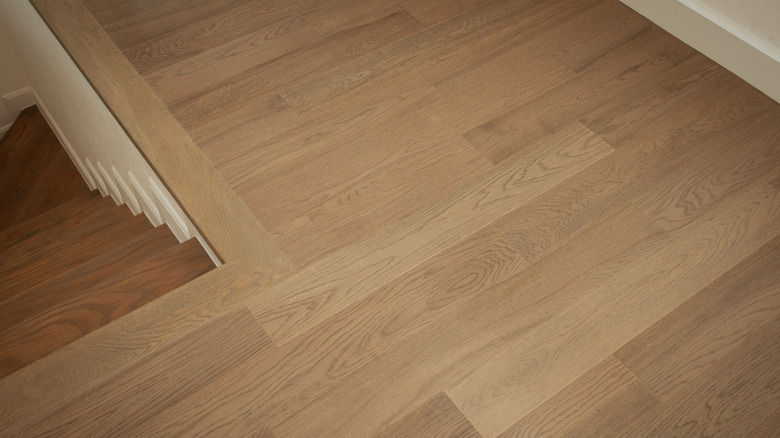HGTV's Mike Holmes Shares A Flooring Option You Can Count On For Durability & Style
When building or renovating a space, contractor Mike Holmes has his pick of flooring choices. Floors come in an array of styles and sizes, but the most important thing to consider is what the right type of material will be. For a 2025 "Holmes On Homes: Building A Legacy" project, Holmes needed a floor that could handle daily wheelchair use without being damaged. He chose a flooring type that was strong, sturdy, and would continue to look pristine over time: engineered hardwood.
On Instagram, Holmes listed the attributes that led to his selection of engineered wood. The chosen product included 72 hours of protection against spills on its surface, eco-friendly qualities, and a construction that remains stable under varying temperatures and moisture conditions. He added that the flooring had "enduring quality thanks to next-gen technology. Higher density than other engineered hardwood. Premium-grade wood with longer and wider boards," and finally, "Awesome selection with beautiful color options."
The long, wide engineered wood planks highlighted the kitchen's open floor plan that continued through to the dining room. Engineered wood is durable enough to withstand heavy foot traffic, so scratches from chairs and other furniture wouldn't be a problem. The light-toned hardwood included a stunningly crisp visual with graining that felt classic and welcoming to the space. And lucky for Holmes, a major benefit of engineered hardwood flooring is that it's available in a range of installation formats that make for an easy and time-saving install project.
Engineered hardwood floors have layers of strength
Hardwood flooring is heavily sought after for its unmatched character, premium performance in the home, and naturalistic beauty, but it can be susceptible to moisture damage. Engineered hardwood combines both function and fashion, creating an all-around excellent flooring option. Engineered hardwood is made up of layered components: an authentic wood veneer atop a plywood core. The multiple layers ensure that the floor will be strong and less likely to allow moisture to seep through the planks to the subfloor. It is treated to prevent expansion, which will keep the planks working in the home for longer and will not need to be replaced for years to come.
Floors made of engineered wood have been modified to be even stronger and perform well in more settings of the home. While a solid piece of wood would warp if exposed to water, engineered wood planks may be treated to have water resistance. The thick layers of engineered wood flooring make it capable of absorbing and softening sound as well. Since the top layer is a real wood veneer, these floors can tout the most elegant visuals that hardwood species have to offer, whether that's hickory, oak, maple, or an exotic species. Engineered wood planks can also be customized with different finishes and surface effects to give off an eye-catching look and feel. Make sure to properly maintain and use the right practices to clean engineered wood floors without causing damage over time.
How to pick the right hardwood floor for your home
Once you have decided that hardwood is the right choice for your space, you'll need to pick the type that is best for the installation. Hardwood is available in two different categories: solid hardwood vs engineered hardwood. The differences between the two have to do with construction. While engineered hardwood is equally as beautiful as solid hardwood, it includes advanced treatments to perform even better in the home. Understanding the unique characteristics of a flooring type will help you determine which is best suited to your space. For Mike Holmes' project, a durable floor that would stand up against pets and wheelchair use meant that engineered hardwood was the best option.
Because of its multi-layered composition, engineered wood flooring can be installed in basement areas, while solid hardwood should be reserved for above-ground rooms. Engineered hardwood floors are available in formats that are more suitable for DIY projects, while solid wood should typically be installed by a professional to prevent headaches in the future. Engineered wood floors are likely to be found at a lower price point than solid hardwood, making them the ideal product for a budget-friendly purchase.

